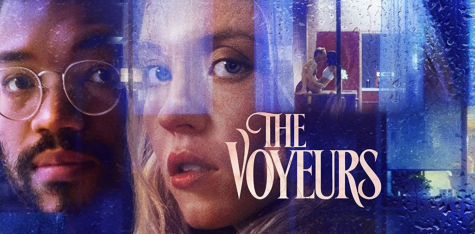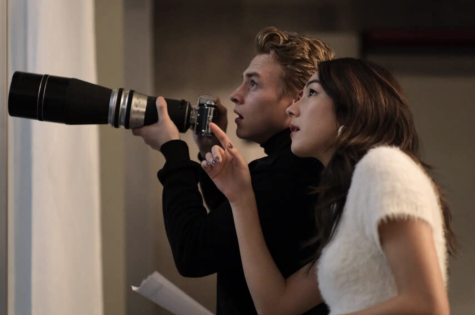REVIEW: ‘The Voyeurs’ questions how far we’ll go for a peek
The descent into madness theme has presented itself in numerous movies: “Black Swan,” “Mother!,” and “American Psycho,” just to name a few. Viewers watch in horror as the chaos takes over the characters and the plot slips from slightly abnormal to horrific in minutes. Viewers lose a grip on reality with the characters, and they have no choice but to experience every emotion—the highest of highs and the most sickening of lows.

“The Voyeurs,” directed by Michael Mahon, opens on Pippa and Thomas, who move in together as a happy young couple, excited to begin the next stage of their lives. Within minutes, their harmonious evening is gone as they watch their neighbors have sex through their open window. The immediate shock of this scene is enough for viewers to know that this movie is not about to be a walk in the park. They both agree it is morally wrong to spy on another couple, but within a few days, Pippa has become entangled in the lives of her neighbors, as she silently compares their sex life to her own dissatisfaction.
Despite their stance of morality, Pippa and Thomas find a way to listen in on the conversations their neighbors have. Pippa’s original jealousy of the couple across the street is crushed when the opposing couple have a physical altercation, followed by several incidents of the husband cheating with multiple women, watched by Pippa and Thomas. The wife in the couple across the street, Julia, develops a relationship with Pippa through Pippa’s work, though Pippa feels as if she knows Julia personally. She feels an obligation to tell Julia about her husband’s wrongdoings, but Thomas advises against it. He feels insecure and inadequate, feeling as though Pippa is filling her sexual desires with the neighbors’ drama. In the following betrayal of Thomas’ trust, Pippa goes overboard. Her personal feelings towards Julia cause her to involve herself completely, and from here only chaos follows. We find that Julia’s husband is named Seb, and he has intrigued Pippa just as much as Julia has. Her erratic behavior has been hinted at since the beginning of the movie, but in order to serve her purpose in the movie, she must lose everything to gain a single moment of power and knowledge.

A key point in the movie is the blurred lines between invitation and allowance. “They want us to look,” Thomas says when they first see the other couple. Once you look, it’s as if you can’t turn away. It alludes to our present day society—our culture is relentlessly nosy, fostering constant comparisons as we attempt to reassure ourselves that we are better than someone. Pippa did not want to admit it, but she secretly longed for what Seb had: unlimited options, constant stimulation and the excitement of the present—and this was all she knew about him. It’s a stark contrast from her life—a bleak career, a feeling of loss and jealousy of others. It’s no wonder she became twisted in the fantasy so quickly and easily. Her perception of every situation is mirrored by her want of this lifestyle: she takes note of every sexual gesture. The cinematography draws this parallel as well, with close-up shots of quivering lips, curves, slight brushes, and lingering gazes. Mahon does not stray from open sexuality, mixed emotions, or utter confusion throughout, and uses the camera to infuse this in the film.
Following Pippa lends itself to the descent into madness theme. She struggles with her dissatisfaction and the slight disconnect she feels between her perception of the world and reality. The disconnect is where the descent begins: early on it’s clear that reality is subjective. The discomfort is only furthered by the tension felt between Pippa, who is followed throughout the movie, and her partner, coworkers and friends.
Sydney Sweeney as Pippa displays every broken emotion, every inference that can be drawn. Her talent really shows, especially in the scene of the mental breakdown after the exhibition. Michael Mahon also portrayed discomfort and tension well throughout the movie. It did, however, seem to lean on shock in order to engage the viewer. The side characters seemed slightly forced, and it was not apparent whether this was intended to further the feeling of disconnect Pippa feels with the world, or it was not possible to make these interactions seem genuine.
The most impressive portion of this movie was the writing: the movie unravels itself completely, then twists itself back up into a knot—it all comes full circle. It questions modern reality, and what’s real. What are the costs of seeing into others’ lives? Are we truly okay with others watching us? How far will we really go to watch—and do we even want to see?







